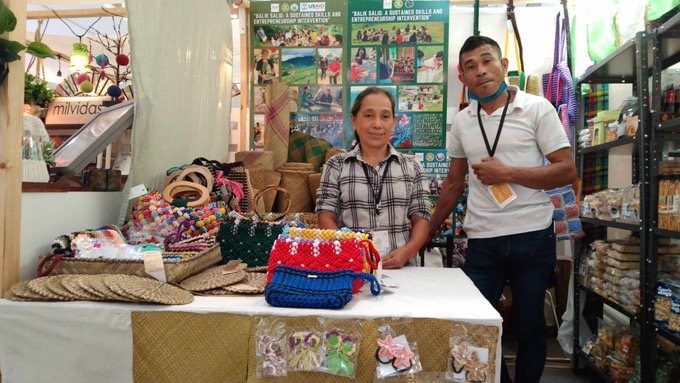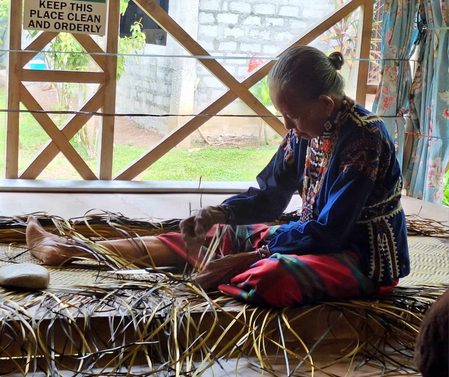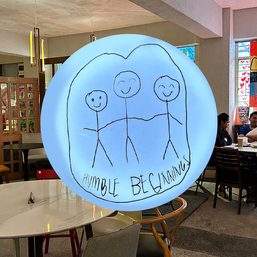SUMMARY
This is AI generated summarization, which may have errors. For context, always refer to the full article.

NEGROS OCCIDENTAL, Philippines – In a rural community in southern Negros Occidental, once a stronghold of communist rebels, residents faced fear and difficulties due to the area’s remote location. This made it challenging for them to access crucial government social services and aid.
Welmie Garlet, 43, recalled the hardships their community in Sitio Madaja, Barangay Buenavista, Himamaylan City, faced because of fierce clashes between state forces and New People’s Army (NPA) rebels.
He said there was a time when villagers had to move from one place to another several times to avoid getting caught in the crossfires.

Garlet said that aside from dealing with conflict, the distance of the nearest market posed a challenge, particularly in transporting their agricultural produce. Instead of selling their goods in the lowlands, many chose to just use their harvest for their own needs.
He said the absence of educational infrastructure added an extra burden to the local community, compelling children to confront daily challenges such as long treks, uphill climbs, and brook crossings, even in harsh weather conditions. Their estimated walking time is nearly two hours.
Sitio Madaja is located in the northernmost area of Barangay Buenavista, approximately 15 kilometers from the Himamaylan city proper.
Tikog-weaving
Garlet is now one of the male weavers in the community, a skill passed down from their ancestors who had lived there since the early days.
Since the community has an abundant source of tikog (reed grass), they are maximizing it in making mats, hats, and other products.
Tikog is a type of grass that grows in a swampy area and is characterized by a solid, jointless, and triangular stem.
The Mahawa products were featured and sold out for two consecutive years at the Negros Trade Fair in Makati City, starting in 2022. The fair holds the distinction of being the longest-running provincial trade fair in the country.
Soon, orders from around the world began pouring in after the trade exhibit, attracted by the uniqueness of their product and the narrative of the community woven into each tikog they offer for sale.
With its potential to help the community alleviate its economic status, the Association of Negros Producers (ANP) came in to assist the community in diversifying their livelihoods with the help of the Provincial Peace and Order Council (PPOC) and the Army’s 94th Infantry Battalion’s Community Support Program (CSP).
ANP is a non-government organization in Negros Island born from the sugar crisis of the 1980s. It has been helping families in rural areas in a mono-crop economy to diversify their livelihood activities.
The organization helped organize the weavers into the Madaja Handweavers Association (Mahawa), and in 2023, they were registered with the Department of Labor and Employment (DOLE).
After their registration, Garlet was elected as the president of the association, and tasked with overseeing and conducting quality checks on the products of other weavers.
Today, the association has 35 weavers, comprising young and elderly members, who have caught the attention of people from neighboring communities to learn and love the craft as well, Garlet said.
The military declared the community as conflict-cleared in 2021, which meant that there was no longer any rebel in the area.
“Kun wala ang ANP kag iban nga mga tawo kag organisasyon nag kadto diri, wala gid kami natalupandan ang amon mga produkto,” Garlet said.
(Our community products would never have been discovered if it weren’t for the ANP and the other individuals and organizations that came here.)
“Nabudlayan kami sang una pati na sa pagtakos sang sizes sang banig pero tungod gusto namon, amat-amat man nga nag maayo amon mga ubra,” he added.
(We initially had trouble following the standard measurements of the mats, but because we love what we do, we managed to figure it out.)
The products have made an impact on the community’s well-being, and the weavers can now provide their children with more necessities and put food on the table, Garlet said.
Mats and other tikog items command prices between P200 to P1,000, depending on the type and size of the product.
Collaboration
Sybel Nobleza, ANP’s external affairs manager, said the weaving project falls under the Provincial Peace and Order Council of Negros Occidental. They are actively working to guarantee work standards and market access for Mahawa and other supported communities in the province.
ANP has continued to provide more training for weavers to further develop their skills despite obstacles, such as logistical issues in transporting their woven items.
Lieutenant Colonel Van Donald Almonte, commander of the Army’s 94th Infantry Battalion, said their commitment to fostering positive change goes beyond traditional roles, and the collaborative effort shows a shared vision for a brighter and more resilient future for Sitio Madaja. – Rappler.com
Add a comment
How does this make you feel?















There are no comments yet. Add your comment to start the conversation.